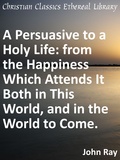John Ray
English naturalist, sometimes referred to as the father of English natural history
Biography
John Ray was born in Black Notley, Essex, England, to Roger Ray, a blacksmith, and Elizabeth Ray, an amateur herbalist and medical practitioner. He attended Trinity College at Cambridge from 1644–1651, receiving both a bachelor and masters degree. After graduation, he continued at Trinity as an appointed fellow of the college. He taught a number of courses, including Greek, mathematics, and humanities. Ray left his post at Trinity during the Reformation, when he refused to sign an oath required by the Act of Uniformity in 1662. It was at this time that his contribution to taxonomy flourished.
A predecessor of Carl Linnaeus, John Ray was the first naturalist to use the idea of species to distinguish different organisms from each other. Focusing primarily on the classification of plants and basing his system on the work of Aristotle, Ray divided plants into two groups: the moncotyledons and the dicotyledons. Both are still recognized today. In 1693, Ray published the final volume of Histora Plantarum, a complete classification of plants and one of the first natural systems of classification that was based on physical characteristics rather than origin and perceived use.
As part of his work, Ray was able to convincingly show that fossils represented extinct species. At the time, the link between fossils and extinct species was not an accepted model; however, Ray's evidence provided the basis for the formation of a more thorough system of paleontology. Such a view was unusual for a naturalist at this time, particularly considering Ray's strong religious beliefs.
John Ray never lost his love and wonder for nature and had no problem reconciling his views of the world with his views of religion. As well as publishing extensively on natural history, Ray also published many theological works, including The Wisdom of God, and he was only stopped from taking priestly orders by the English civil war and Reformation. According to Ray, the study of nature was a way to reveal the omnipotence of God and to be a naturalist was a way to work within divinity.

